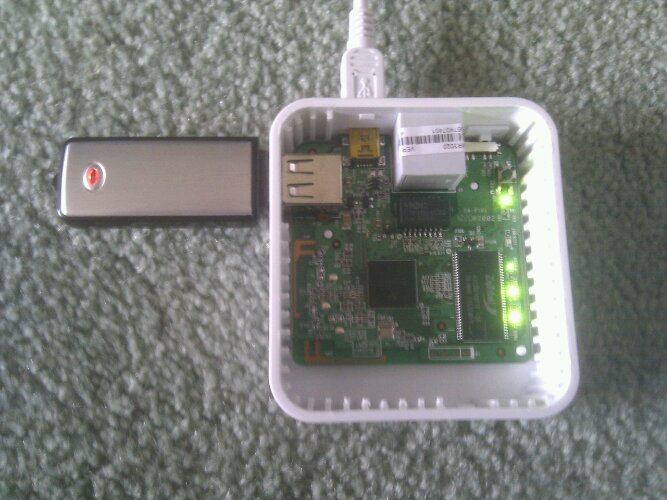So yet again I’ve been really lax at posting, but meh. I’ve still been working on various projects aimed at home automation – this post is a taster of where I’m going…
MQTT (for those that haven’t heard about it) is a real time, lightweight, publish/subscribe protocol for telemetry based applications (i.e. sensors). It’s been described as “RSS for the Internet of Things” (a rather poor description in my opinion).
The central part of MQTT is the broker: clients connect to brokers in order to publish data and receive data in feeds to which they are subscribed. Multiple brokers can be fused together in a heirarchical structure, much like the mounting of filesystems in a unix-like system.
I’ve been considering using MQTT for the communication medium in my planned home automation/sensor network projects. I wanted to set up a heirarchical system with different brokers for different areas of the house, but hadn’t settled on a hardware platform. Until now…
…enter the TP-Link MR3020 ‘travel router’, which is much like the TL-WR703N which I’ve seen used in several hardware hacks recently:

I had to ask a friend in Hong Kong to send me a couple of these (they aren’t available in NZ) – thanks Tony! (UPDATE 2019: Of course now you can get these shipped direct, something I didn’t know about in 2012). Once I received them installing OpenWRT was easy (basically just upload through the exisiting web UI, follow the instructions on the wiki page I linked to above). I then configured the wireless adapter in station mode so that it would connect to my existing wireless network and added a cheap 8GB flash drive to expand the available storage (the device only has 4MB of on-board flash, of which ~900KB is available after installing OpenWRT). I followed the OpenWRT USB storage howto for this and to my relief found that the on-board flash had enough space for the required drivers (phew!).
Once the hardware type stuff was sorted with the USB partitioned (1GB swap, 7GB /opt) and mounting on boot, I was able to install Mosquitto, the Open Source MQTT broker with the following command:
$ opkg install mosquitto -d opt
The -d option allows the package manager to install to a different destination, in this case /opt. Destinations are configured in /etc/opkg.conf.
It took a little bit of fiddling to get mosquitto to start at boot, mainly because of the custom install location. In the end I just edited the paths in /opt/etc/init.d/mosquitto to point to the correct locations (I changed the APP and CONF settings). I then symlinked the script to /etc/rc.d/S50mosquitto to start it at boot.
That’s about as far as I’ve got, apart from doing a quick test with mosquitto_pub/mosquitto_sub to test everything works. I haven’t tried mounting the broker under the master broker running on my home server yet.
The next job is to investigate the serial port on the device in order to attach an Arduino clone which I soldered up a while ago. That will be a story for another day, hopefully in the not-to-distant future!
Leave a Reply